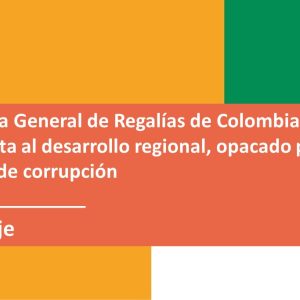The importance of transparency and citizen participation in energy transition
For Mariela Cardona, cooking with firewood and gasoline is just a memory in the farm where she lived her youth in a village of Aguadas, Caldas. The transition from cooking with wood to cooking with gas was slow, but by the late 1990s it had been achieved. He did so because he listened to his neighbors and city officials talk about the advantages this change would bring to human health and the environment.
As in the case of Mariela, the energy transition aims to reduce the consumption of coal, oil and gas as the main source of energy, in order to advance in the implementation of clean and renewable energies, environmentally friendly, such as hydroelectric, wind, solar, biomass, among others. This transition has the same objective that was pursued at the time of stopping cooking with wood or gasoline: to take care of people’s health and mitigate the adverse effects of climate change.
The world is betting on change
Countries such as Norway, Iceland and Denmark are among those leading this change in Europe, according to the Fostering Effective Energy Transition report , 2021 edition.
In Latin America, the initiative is also opening up ground with countries such as Uruguay, which between 2017 and 2021 generated 94% of electricity through renewable sources, according to information from that country’s Ministry of Industry, Energy and Mining. In recent years, Colombia has been following these steps and is working on actions to strengthen the energy transition at the regional level. For example, the current government, headed by President Gustavo Petro, released the text of the National Development Plan 2023-2026, Colombia World Power of Lifewhich has 5 major goals, one of which is the Productive Transformation, Internationalization and Climate ActionThe proposal is to promote the energy transition based on the “diversification of productive activities that take advantage of natural capital and deepen the use of clean energy, that are intensive in knowledge and innovation, that respect and guarantee human rights, and that contribute to building resilience to climate shocks.”.
In addition, the country’s goal is to reduce greenhouse gas emissions by 51% by 2030 and achieve carbon neutrality by 2050, according to the Carbon Neutral Colombia Strategy (ECCN) under the leadership of the Ministry of Environment and Sustainable Development.
People first
According to Juliana Peña Niño, from the Natural Resource Governance Institute
[1]
1], for the energy transition to be successful, it must be focused on citizens. “Transitions are changes that are planned and are hand in hand with the participation of communities and key stakeholders,” she says.
He assures that these dialogues should have a differential approach according to the regions, in order to address the economic, political, social and environmental needs of each territory. “Legitimacy and dialogue is different in a region like La Guajira, Cesar or the Colombian Amazon. It is to understand that there are differential production chains“.
Juliana is also emphatic in mentioning that governments and companies as part of the energy transition must generate regional intervention mechanisms, participation methodologies, and the publication of information in different formats and languages that are easy to access and understand, so that citizens understand the consequences and needs of the transition: “We are convinced that the energy transition will have a positive impact on our society.We must go beyond just making the information public, we must explain it, make sure it is understood, in order to reduce asymmetries with the citizens, to guarantee the success of the transition“.
Increased citizen participation
Although the Political Constitution of Colombia and different laws such as the Statutory Law on Citizen Participation, Law 1712 of 2014 on Transparency, offer legal guarantees for citizen participation and cooperation mechanisms for civil society organizations, for some experts these tools fall short and sometimes, in practice, there are no guarantees for their due compliance.
Óscar Iván Galvis Mora, from the Colombian Strategy for Adapted and Resilient Low Carbon Development, assures that the information that exists is not in a clear and simple language for an ordinary citizen to understand and take action.
“You can find documents on energy transition, but some are still very technical, which creates a constraint on access to information.“He also explains the importance of dialoguing with communities and making information available to all, including digital platforms, but also methodologies for people who do not have access to them. He even proposes going beyond the Spanish language, recalling that there are different indigenous communities that do not have access to this information in their own languages.
Both experts highlight the importance of the articulation of different citizens’ organizations such as NGOs, foundations, grassroots communities and other civil society organizations so that their voices are heard and taken into account in the formulation of public policies. An example of this is the Civil Society Roundtable for Transparency in the Extractive Industries, which promotes access to information and citizen participation in issues related to the energy transition based on the contributions of the more than 20 organizations that comprise it.
In response to the questions posed for this report, Mariela Cardona, who switched from firewood to natural gas, opens Google, presses voice search and asks: “Energy transition in Colombia”, the search engine returns several results that shed some light, but he wonders why most of the information that appears comes from the media, the national government and very little from the Extractive Industries? Evidencing that the work must continue along these lines.
For more information, please write to: secretariatecnica@transparenciacolombia.org.co
[1] Organización miembro de la Mesa de la Sociedad Civil para la Transparencia en las Industrias Extractivas.


